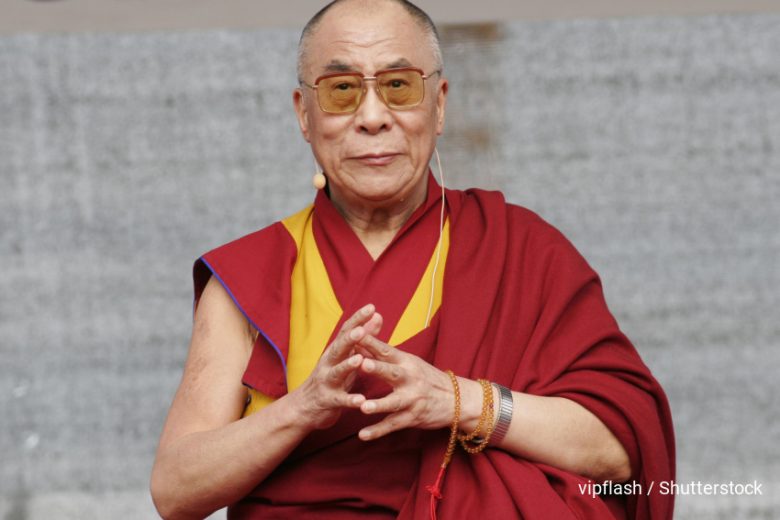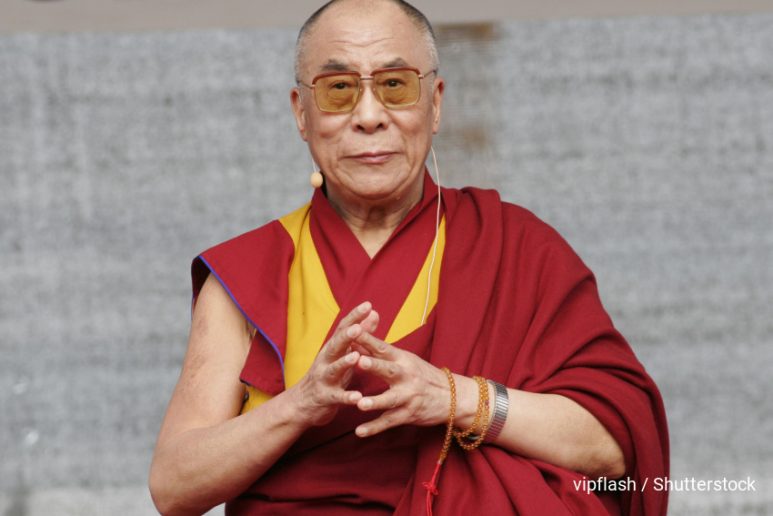Written by Kounsar Bashir
Followers of the Dalai Lama were shocked when a controversial video clip showing the 87-year-old Tibetan spiritual leader asking a small kid to suck his tongue at a public event went viral. The clip made a huge buzz on social media, inviting condemnation and prompting an apology.
The incident took place on February 28 at an event at a temple in McLeod Ganj, a suburb of Dharamshala, where around 100 school students were present.

In the video, a boy asks if he can hug the Dalai Lama, who then invites the boy on stage and points to his cheek, saying, “First here,” prompting the boy to give him a hug and a kiss. The Tibetan spiritual leader then points to his lips, and says: “Then I think finally here also.” He then pulls the boy’s chin and kisses him on the mouth.” And suck my tongue,” he says after a few seconds, poking his tongue out.
The incident caused a massive uproar and received condemnation globally. Afterwards, the Dalai Lama apologized to his followers for thehurt his words may have caused. While regretting his action, the official Twitter handle of the Buddhist spiritual leader said: “A video clip has been circulating that shows a recent meeting when a young boy asked his holiness the Dalai Lama if he could give him a hug. His Holiness wishes to apologize to the boy and his family, as well as his many friends across the world, for the hurt his words may have caused. His Holiness often teases people he meets innocently and playfully, even in public and before cameras. He regrets the incident.”
But did the media’s coverage blow the incident out of proportion? Some have highlighted that Tibetan culture is different. Tibetan activist Namdol Lhagyari, who is living in exile, wrote on Twitter “Expression of emotions and manners today has been melted together and become vividly westernized. Bringing in the narrative of other cultures, customs and social influence on gender and sexuality to interpret Tibetan way of expression is heinous,” adding “With due respect, I don’t see the need for an apology for the playful and tongue-in-cheek demeanor His Holiness the 14th Dalai Lama is applauded worldwide for multicultural manners”.
Expression of emotions and manners today has been melted together and become vividly westernised. Bringing in narrative of other cultures, customs and social influence on gender and sexuality to interpret Tibetan way of expression is heinous. 1/3 pic.twitter.com/heFDSEmVlp
— Namdol.Lhagyari ལྷ་རྒྱ་རི་རྣམ་སྒྲོལ། (@namdol_lhagyari) April 10, 2023
Indian Express, the leading newspaper in India, quoted a Tibetan leader as saying “It looked inappropriate, but there was no bad intention on the part of the Dalai Lama. It was only when the boy told him that he wanted to hug him, that the Dalai Lama, maybe out of innocence, uttered some words. Also, it appears that the video that is going viral may have been initially circulated by the Dalai Lama’s office because cell phones and cameras are not allowed at such events due to security reasons. The Dalai Lama shows his love and compassion for all the people, young or old, who meet him. There could be nothing more than that.”
The Institute of East Asia Studies at UC Berkeley states on its website that sticking out one’s tongue is a sign of respect or agreement and was often used as a greeting in traditional Tibetan culture.
Responding to the incident, prominent Delhi-based child rights group, Haq: Center for Child Rights said it condemned “all forms of child abuse”.
“Some news refers to Tibetan culture about showing tongue, but this video is certainly not about any cultural expression, and even if it is, such cultural expressions are not acceptable,” the group told CNN.
Advocate Syed Mujtaba, a Child’s Rights Lawyer based in Jammu and Kashmir, told Media Diversity Institute: “There is a disparity between child rights protection and adult rights protection. If a child’s rights are being violated, it is the responsibility of adults to protect their rights, because a child is not in a position to protect her/his rights. Being an adult, we have adopted a culture of compromise when it’s about the child’s rights”.
“Being specific to the Dalai Lama incident, the government and international organizations are spreading huge awareness about the good touch and the bad touch. For a child, there is no touch which is good or bad because sometimes there is a touch which is inappropriate for the child according to the age or the cultural context,” Mujtaba added.
According to Mujtaba from the cultural context of India, the Dalai Lama actions come under the “bad touch.” To examine this act, thePOCSO Act (The Protection of Children from sexual offense) needs to be considered.
What is the POCSO Act?
The Protection of Children from Sexual Offences Act, 2012 was enacted to provide a robust legal framework for the protection of children from offenses of sexual assault, sexual harassment, and pornography while safeguarding the interest of the child at every stage of the judicial process.
Mujtaba told Media Diversity Institute: “The bodies which are meant for the child rights protection should examine this act whether this comes under sexual harassment or not. We are not here to judge but it is for the court and child rights bodies to look at it.”
Mujtaba added that specifically, philosophically, spiritually, religiously, and culturally, the Dalai Lama’s action is “not acceptable in our culture”.
The media’s role
When some type of harassment happens to the child, we call it primary victimization but the media should not have circulated the video to this extent . If the child watches this video after 2-3 years what will happen to their mental health? While talking about these sensitive issues the media should be vigilant while addressing the issues.
They (the media) should ask themselves by their reporting, is there any secondary victimization happening or not?
“There were very few activists who became vocal about the Dalai Lama incident, the expectations which were expected from the Child Protection agencies like the Child Rights Commission of the state where the incident happened or the National Commission for the Child Rights were not addressed.” The voices should rise against it because it can be a precedent in the spiritual world and if this is a matter of sexual harassment it should be investigated under POSCO Act.
On 15th April protests were organized in Leh, the capital city of the Union Territory of Ladakh by the Ladakh Buddhist Association and the Ladakh Gonpa Association. In a joint statement, both organizations said that they “strongly and unequivocally condemn the malicious intent of some evil forces to discredit His Holiness to please their benefactors”. The protesters were chanting the slogans “Long live Dalai Lama” and “Down with media”.
Other controversies
Tenzin Gyatso, the 14th Dalai Lama, is a spiritual leader of the Tibetan people. Born in the small village of Taktser in Tibet, His Holiness was recognized at the age of two, following Tibetan tradition, as the reincarnation of his predecessor the 13th Dalai Lama. Dalai Lamas are the manifestations of the Bodhisattva of Compassion, who choose to reincarnate to serve the people. In 1959, the Dalai Lama left his homeland of Tibet on horseback due to Chinese persecution against Buddhists. Since then, he has been living in exile. After three decades, he was honored with the Nobel peace prize for being a messenger of non-violence.
This is not the first time the Dalai Lama’s comments have caused controversy.
In 2015, the Dalia Lama said that “If a female Dalai Lama comes, then that female must be very attractive otherwise not much use”. The comment caused a backlash.
In August 2018, the Dalai Lama said that Jawaharlal Nehru’s “self-centered attitude” was the reason why Muhammad Ali Jinnah could not be appointed the Prime Minister of India. His office later apologised for his remarks. In 2019, in an interview with the BBC, the Dalia Lama made a statement that he did not want to see Europe become “Muslim or African”.
Photo Credits: vipflash / Shutterstock

